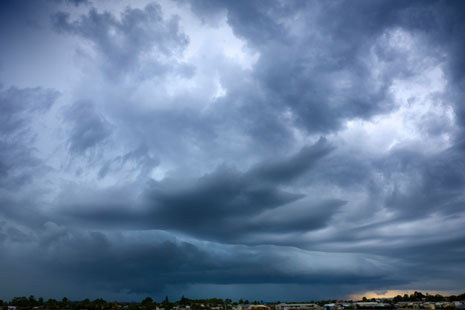AS A POLITICAL ISSUE, climate change presents almost insurmountable difficulties for a right of centre party like the Liberal Party, whose very raison d’etre is to defend and promote capitalism. The neo-liberal system to which it is wedded can flourish only under conditions of permanent and unrestricted economic growth – as utopian a dream as any ever emanating from the left.
The neo-liberals have invested great energy in seeking to discredit capitalism’s critics; this is the real core of what we now call the culture wars. But when unfettered growth hits an obstacle not of the making of humankind – that is, nature itself – then the whole neo-liberal apparatus is in real trouble. How can you mount a culture war against nature?
For some years the climate change sceptics, of which the former prime minister was one, simply avoided confronting the problem, preferring instead to wish it wasn’t there and hide behind the rash of dubious sceptic propaganda, most of it originating from websites funded by the likes of Exxon. It was so easy to merely shrug the shoulders and say the jury was still out, but as I have written before John Howard probably realised what it all meant some time ago. The fact that he still chose to do nothing rather compounds his sin of omission.
And this is the real nub of the problem for Malcolm Turnbull, who is by no means a climate change sceptic. How do you tell your business constituency that the time for business as usual has long passed? That costs will be higher? That profit-taking will be much reduced? That regulation will be tighter? That the days of freebooting capitalism are gone forever?
The Labor Party is by no means immune from these same issues, but it at least has a little more room in which to manoeuvre, shaking off the dust (at least rhetorically) from the social democratic mantle that was shed so brutally in 1983. While Labor is at least trying to address the issues, however feebly, the consequences of a modified capitalism are not as cataclysmically existential for them as they are for the Liberals.
Yet Kevin Rudd’s tortuous road towards an emissions trading scheme demonstrates just how pervasive has been the influence of the free market Chicago School on Labor’s thinking. Far from a retreat into a social democratic past, what we are seeing is the total capitulation of Labor to the ideological construction of free market environmentalism. This is epitomised in the concept of emissions trading, which regards pollution not so much as a social problem in itself as a form of market failure. Despite the protestations to the contrary, carbon trading is simply an infiltration of the free market into public spaces and environmental policy-making. While there is a potential public good in the overall process – that is, a reduction in greenhouse gas emissions – the essence of the approach is to save polluters money.
Like conservatives of any stripe, the first response is to try to cloak the interests of the powerful few in the guise of the interests of all – so when Malcolm Turnbull goes on repeating his mantra of “jobs, jobs, jobs” he is really saying “profits, profits, profits.” (And they only coincide if one accepts the constricted logic of capitalism and the vacuous repetition of TINA – There Is No Alternative).
But Turnbull’s dilemma has been – and continues to be – how to oppose the Rudd Plan without being cast as socially irresponsible, especially as many Liberal voters now accept that something must be done. Last July, Turnbull wrote an article in the Sydney Morning Herald in which he identified the challenge as designing an emissions scheme that efficiently delivers least-cost abatement, protects jobs and industries and is administratively straightforward. This sounds very reasonable and common sense-like, but it is essentially a minimalist approach that seeks to change very little; it would very likely result in no gain at all. It totally ignores the fact that things really have to change; that business will take a hit; and that government will be heavily involved.
Turnbull continues to insist in speech after speech, echoing Margaret Thatcher, that the problem is simply one of risk management – and in that vein he sounds more like a merchant banker than putative prime minister. There is something faintly absurd in treating a potential global catastrophe as just another everyday event that can be managed.
The politics of Turnbull’s position present a range of difficulties. For a start, there are those within his own ranks who find little problem in agreeing with Rudd’s mild proposals. There is also the problem of the Nationals, within whose ranks dwell a number of diehard climate change sceptics quite prepared to die in the ditches.
But the opposition leader has not been entirely idle on the policy front, unveiling in January his own “Green Carbon Initiative” – a comprehensive biocarbon strategy of investing in the health of our landscape, restoring soil carbon by reversing over-grazing and excessive tillage, embedding CO2 in bio-char or charcoal, tree planting and revegetation. It also proposes dramatically increasing energy efficiency, especially in buildings, and constructing several carbon capture and storage power stations (whose technology remains unproven) as well as deploying industrial scale solar energy and geothermal energy and harnessing the energy of the oceans through tidal and wave power.
These are bold ideas, but logically they should come after initial action to minimise the existing problem, rather than seeking merely to manage it.
What Malcolm Turnbull cannot do – and is politically, ideologically and existentially incapable of doing – is to question the very dynamics of an unrestrained capitalism that has wreaked such havoc in the course of providing us with abundance of everything, including pollution. But that is precisely what needs to be questioned, otherwise we are destined for more of the same. •




